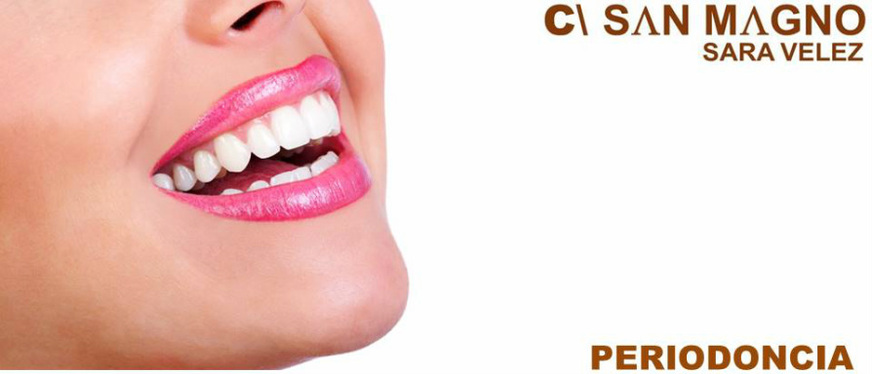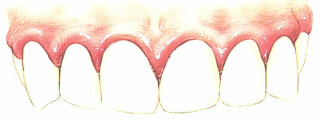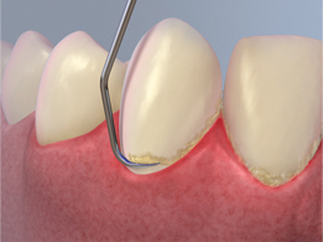
Periodontics is the specialty that studies the prevention, diagnosis and treatment of diseases that affect the tissues surrounding the teeth and implants.
The most common periodontal diseases are gingivitis and periodontitis, which involve inflammation and even the loss of those tissues, with the subsequent loss of teeth.
Gingivitis and periodontitis are not the same although they have a totally direct relationship, since periodontitis is an advanced stage of gingivitis.

WHAT IS GINGIVITIS?

Gingivitis is an inflammation of the gums caused by bacterial plaque, an adhesive film that accumulates on the teeth and gums. The plaque generates acids and toxins that can cause redness, swelling or bleeding of the gums.
SYMPTOMS GINGIVITIS:
- Inflammation of the gums.
- Retraction of the gums.
- Gums that bleed easily when brushing or flossing.
- Change in the color of gums from pink to dark red.
- Bad breath.
 Periodontitis or “pyorrhea” occurs when there is swelling or infection of the gums (gingivitis) and is not treated. Infection and inflammation spread from the gums (gingiva) to the ligaments and bone that support the teeth. The loss of support causes the teeth to loosen and eventually fall off. Periodontitis is the main cause of tooth decay in adults.SYMPTOMS PERIODONTITIS
Periodontitis or “pyorrhea” occurs when there is swelling or infection of the gums (gingivitis) and is not treated. Infection and inflammation spread from the gums (gingiva) to the ligaments and bone that support the teeth. The loss of support causes the teeth to loosen and eventually fall off. Periodontitis is the main cause of tooth decay in adults.SYMPTOMS PERIODONTITIS
- Constant bad breath.
- Red or inflamed gums.
- Gums very sensitive or bleeding.
- Pain when chewing.
- Loose teeth.
- Sensitive teeth
- Receding gums or teeth that look longer than normal.
Why does it happen?
This term refers to the treatment of all the problems of the gums and the bone that holds the teeth. Each tooth is embedded in the bone, strongly linked by a series of structures that ensure its strength and proper functioning.
Sometimes, the structures that surround and support the tooth (gums and bone), can be affected and if not treated in time, we can lose our teeth. At Clínica Dental San Magno, we can detect the different phases of this process and help correct them. This process is called periodontitis.
Long-term consequences
The fundamental long-term consequence is the loss of most or all of the teeth. This loss brings with it the consequences of edentation: difficulty in chewing, stomach problems, significant aesthetic alteration, pain, bad breath, bleeding gums, etc. Sometimes, this affectation can produce heart problems in susceptible patients.
How to detect it?
The main cause is an infection caused by various types of bacteria. Most of these bacteria are found in normal circumstances in the mouth of any individual, but some people have a defense system that is not effective against them. It is then when the infection occurs that it will weaken our teeth.
There are a series of symptoms that allow to recognize this condition in any of its stages.
How to solve it?

The basic treatment is to eliminate the existing infection by thoroughly cleaning the entire mouth, under local anesthesia. If the condition is very advanced or regeneration is required, a small surgical intervention is required, also under local anesthesia. The treatment can be complemented with the use of antibiotics.
The most important thing is that the patient is aware of their problem and assumes that, after the initial treatment, at least once a year should go to the dentist to perform maintenance cleanings, for the rest of his life. Oral hygiene is essential to treat these types of problems. Only in this way is an effective therapy achieved.
Basic step-by-step treatment
The basic treatment consists in the exhaustive cleaning of the gums by means of an ultrasonic apparatus, curettes (sweeping instruments) and polishers, in order to eliminate all the bacterial plaque that causes the problem. This task is what our dentist is going to do, so that after cleaning, the inflammation decreases and the gum adheres again to the tooth forming a barrier so that bacteria do not pass.
The basic treatment is done in parts. The mouth is divided into 4 quadrants, each of which is treated in different sessions. Each cleaning session is done under local anesthesia, so it does not hurt. Its duration is about 45-60 min. At the end of the session and remit the anesthetic effect, the patient reports very little discomfort, and in 3 or 4 days the condition of the gums improves surprisingly.
Care and maintenance:
Periodontitis is caused by a generalized infection of the mouth. Therefore, at Clínica Dental San Magno we recommend you, after performing the appropriate treatment:
– Maintain optimal hygiene levels that prevent bacterial development.
– Follow all the steps set by our dentists (specific treatment at home, instructions …).
– Brush your teeth after every meal.
– Visit the dentist every 4 or 6 months for a review.